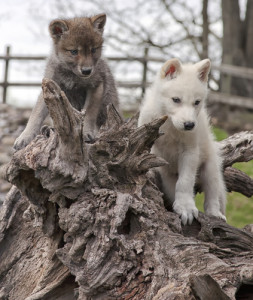 The wolf brings forth thoughts of majesty, independence, spirit and drive. It is only natural that some would want the unbridled splendor of a wolf, paired with the loyalty of a domesticated dog. Before anyone knew it, the wolf hybrid came onto the scene. Wolf advocates praised the advances in trying to preserve the wolf’s lineage. Evolutionary biologists shake their heads in dismay. The wolf is a wild animal, plain and simple. No amount of hybrid cross breeding can change that and eventually the wild beast will emerge. The results could be devastating.
The wolf brings forth thoughts of majesty, independence, spirit and drive. It is only natural that some would want the unbridled splendor of a wolf, paired with the loyalty of a domesticated dog. Before anyone knew it, the wolf hybrid came onto the scene. Wolf advocates praised the advances in trying to preserve the wolf’s lineage. Evolutionary biologists shake their heads in dismay. The wolf is a wild animal, plain and simple. No amount of hybrid cross breeding can change that and eventually the wild beast will emerge. The results could be devastating.
Born to be wild
Wolves have not been domesticated like dogs have. Bringing a wolf hybrid into the home, an owner brings in the possibility of unpredictable behavior and the natural instinct to fight for food and possessions.
Too cool for school
A hybrid is intelligent and therefore trainable. But a hybrid does not have that innate desire to please their owner like a dog does. The wolf part of the hybrid will only tolerate training as long as he is engaged and will not hesitate to walk away when he’s finished.
Leading experts weigh in
Evolutionary biologists argue that crossing a dog with a wolf is a recipe for disaster. A wolf has a high predatory drive. Crossed with a domesticated dog, a hybrid takes out the natural fear of humans wolves harbor but retains the hunting instinct all wolves possess. Another argument being made is that once a wolf reaches full maturity, about the age of three, is when they start jockeying for position in their pack, including challenging the alpha for leadership of the pack. An unprepared owner asking their wolf hybrid to move off the couch may not be pretty.
Legislation
There are currently eleven states in America that don’t allow wolf hybrids as pets. Most states have strict regulations on ownership such as vaccinations, which are approved for “dogs” only and registration needs to be filed with officials informing them a crossbreed has moved into town. Owning a hybrid requires sterilization of the dog, to prevent irresponsible breeding. There is also an added expense of liability insurance. There are several companies that won’t cover “dangerous” breeds.
Ownership woes
Wolf mixes don’t do well on a diet of commercial diet and need meat added to their diet. Proper socialization is crucial to a wolf mix, often requiring several hours a day of interaction. Owners are encouraged to spend twenty-four hours a day with puppies to create bonds of trust. Even after all the careful socialization and interaction there is no guarantee the wolf cross will be domesticated.
